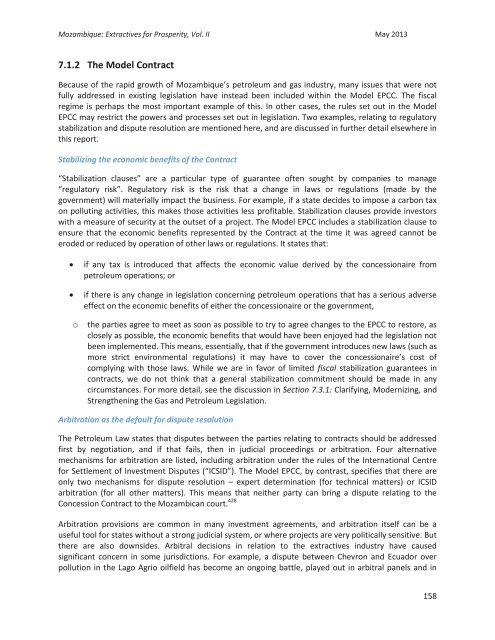Mozambique - School of International and Public Affairs - Columbia ...
Mozambique - School of International and Public Affairs - Columbia ...
Mozambique - School of International and Public Affairs - Columbia ...
You also want an ePaper? Increase the reach of your titles
YUMPU automatically turns print PDFs into web optimized ePapers that Google loves.
<strong>Mozambique</strong>: Extractives for Prosperity, Vol. II May 2013<br />
7.1.2 The Model Contract<br />
Because <strong>of</strong> the rapid growth <strong>of</strong> <strong>Mozambique</strong>’s petroleum <strong>and</strong> gas industry, many issues that were not<br />
fully addressed in existing legislation have instead been included within the Model EPCC. The fiscal<br />
regime is perhaps the most important example <strong>of</strong> this. In other cases, the rules set out in the Model<br />
EPCC may restrict the powers <strong>and</strong> processes set out in legislation. Two examples, relating to regulatory<br />
stabilization <strong>and</strong> dispute resolution are mentioned here, <strong>and</strong> are discussed in further detail elsewhere in<br />
this report.<br />
Stabilizing the economic benefits <strong>of</strong> the Contract<br />
“Stabilization clauses” are a particular type <strong>of</strong> guarantee <strong>of</strong>ten sought by companies to manage<br />
“regulatory risk”. Regulatory risk is the risk that a change in laws or regulations (made by the<br />
government) will materially impact the business. For example, if a state decides to impose a carbon tax<br />
on polluting activities, this makes those activities less pr<strong>of</strong>itable. Stabilization clauses provide investors<br />
with a measure <strong>of</strong> security at the outset <strong>of</strong> a project. The Model EPCC includes a stabilization clause to<br />
ensure that the economic benefits represented by the Contract at the time it was agreed cannot be<br />
eroded or reduced by operation <strong>of</strong> other laws or regulations. It states that:<br />
<br />
<br />
o<br />
if any tax is introduced that affects the economic value derived by the concessionaire from<br />
petroleum operations; or<br />
if there is any change in legislation concerning petroleum operations that has a serious adverse<br />
effect on the economic benefits <strong>of</strong> either the concessionaire or the government,<br />
the parties agree to meet as soon as possible to try to agree changes to the EPCC to restore, as<br />
closely as possible, the economic benefits that would have been enjoyed had the legislation not<br />
been implemented. This means, essentially, that if the government introduces new laws (such as<br />
more strict environmental regulations) it may have to cover the concessionaire’s cost <strong>of</strong><br />
complying with those laws. While we are in favor <strong>of</strong> limited fiscal stabilization guarantees in<br />
contracts, we do not think that a general stabilization commitment should be made in any<br />
circumstances. For more detail, see the discussion in Section 7.3.1: Clarifying, Modernizing, <strong>and</strong><br />
Strengthening the Gas <strong>and</strong> Petroleum Legislation.<br />
Arbitration as the default for dispute resolution<br />
The Petroleum Law states that disputes between the parties relating to contracts should be addressed<br />
first by negotiation, <strong>and</strong> if that fails, then in judicial proceedings or arbitration. Four alternative<br />
mechanisms for arbitration are listed, including arbitration under the rules <strong>of</strong> the <strong>International</strong> Centre<br />
for Settlement <strong>of</strong> Investment Disputes (“ICSID”). The Model EPCC, by contrast, specifies that there are<br />
only two mechanisms for dispute resolution – expert determination (for technical matters) or ICSID<br />
arbitration (for all other matters). This means that neither party can bring a dispute relating to the<br />
Concession Contract to the Mozambican court. 428<br />
Arbitration provisions are common in many investment agreements, <strong>and</strong> arbitration itself can be a<br />
useful tool for states without a strong judicial system, or where projects are very politically sensitive. But<br />
there are also downsides. Arbitral decisions in relation to the extractives industry have caused<br />
significant concern in some jurisdictions. For example, a dispute between Chevron <strong>and</strong> Ecuador over<br />
pollution in the Lago Agrio oilfield has become an ongoing battle, played out in arbitral panels <strong>and</strong> in<br />
158

















